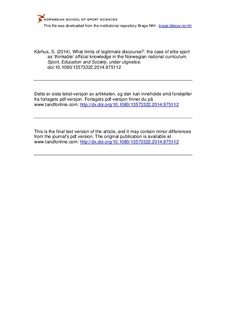| dc.contributor.author | Kårhus, Svein | |
| dc.date.accessioned | 2016-04-05T12:02:34Z | |
| dc.date.available | 2016-04-05T12:02:34Z | |
| dc.date.issued | 2014-11-07 | |
| dc.identifier.citation | Sport, Education and Society. 2014, under utgivelse. doi: 10.1080/13573322.2014.975112 | nb_NO |
| dc.identifier.uri | http://hdl.handle.net/11250/2384012 | |
| dc.description | I Brage finner du siste tekst-versjon av artikkelen, og den kan inneholde ubetydelige forskjeller fra forlagets pdf-versjon. Forlagets pdf-versjon finner du på www.tandfonline.com: http://dx.doi.org/10.1080/13573322.2014.975112 / In Brage you'll find the final text version of the article, and it may contain insignificant differences from the journal's pdf version. The definitive version is available at www.tandfonline.com: http://dx.doi.org/10.1080/13573322.2014.97511 | nb_NO |
| dc.description.abstract | In 2006, elite sport was introduced into the Norwegian national curriculum as an elective subject in the pre-tertiary school. Grades achieved in this 5-hours-a-week subject count towards school-leavers' overall attainment grades. Prior to 2006, this subject was only offered as a specially adapted, alternative pedagogy in private schools. The paper analyzes how ideas about elite performance have become mainstream, particularly in light of the seeming lack of public policy supporting such a development. By using Bernstein's conceptual tools, it analyzes the few existing policy statements about elite sport in the pre-tertiary education sector and builds on interview data with key policy players in the Norwegian Parliament in order to shed light on this seemingly market-driven development. It asks which discourses have legitimated the transformation of elite sport skills, knowledge and values from an exclusive private school niche to national curricular knowledge to meet the physically, most-able and ambitious athlete-students in the pre-tertiary schools, and in so doing, include the development of sport athletes as an educational task of the comprehensive school system. Finally, it addresses whether agencies outside education policy circles may have affected the legitimation of elite sport as elective curricular knowledge to a certain group of students. | nb_NO |
| dc.language.iso | eng | nb_NO |
| dc.publisher | Routledge | nb_NO |
| dc.subject | education policy discourses | nb_NO |
| dc.subject | elite sport subject | nb_NO |
| dc.subject | pre-tertiary school national curriculum | nb_NO |
| dc.subject | market-driven development | nb_NO |
| dc.subject | recontextualization of policy | nb_NO |
| dc.title | What limits of legitimate discourse?: the case of elite sport as ‘thinkable’ official knowledge in the Norwegian national curriculum | nb_NO |
| dc.type | Journal article | nb_NO |
| dc.type | Peer reviewed | nb_NO |
| dc.subject.nsi | VDP::Social science: 200 | nb_NO |
| dc.subject.nsi | VDP::Social science: 200::Social science in sports: 330 | nb_NO |
| dc.subject.nsi | VDP::Social science: 200::Social science in sports: 330::Other subjects within physical education: 339 | nb_NO |
| dc.source.journal | Sport, Education and Society | nb_NO |
| dc.description.localcode | Seksjon for coaching og psykologi / Department of Coaching and Psychology | nb_NO |
